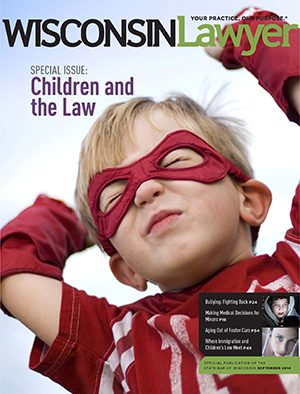More Court Action Expected on Wisconsin’s Campaign Finance Laws
 In the October Wisconsin Lawyer, the article “Decoding the Maze: Wisconsin’s Campaign Finance Laws” described the impact of court decisions on Wisconsin campaign finance law and the subsequent confusion when statutes and administrative rules are not updated to keep pace with the courts. Even as we were drafting the article, Wisconsin laws were impacted by a federal court decision and guidance by the Wisconsin Government Accountability Board (G.A.B.), which regulates campaigns and elections. Then, shortly after the article went to print, the 7th Circuit Court of Appeals issued a decision in one of six cases regarding the much-publicized John Doe investigation into the political speech of independent third-party organizations in Wisconsin.
In the October Wisconsin Lawyer, the article “Decoding the Maze: Wisconsin’s Campaign Finance Laws” described the impact of court decisions on Wisconsin campaign finance law and the subsequent confusion when statutes and administrative rules are not updated to keep pace with the courts. Even as we were drafting the article, Wisconsin laws were impacted by a federal court decision and guidance by the Wisconsin Government Accountability Board (G.A.B.), which regulates campaigns and elections. Then, shortly after the article went to print, the 7th Circuit Court of Appeals issued a decision in one of six cases regarding the much-publicized John Doe investigation into the political speech of independent third-party organizations in Wisconsin.
Our article referenced that case, Wisconsin Club for Growth v. Schmitz, in a discussion about Wisconsin’s prohibition on coordinating independent expenditures with a candidate or candidate’s agent. When an independent organization such as a political action committee (PAC) or corporation sponsors communications advocating for the election or defeat of a clearly identified candidate, it has made an independent expenditure regulated under Wisconsin’s campaign finance statutes. Coordination of these expenditures with a candidate or candidate’s agent is prohibited in Wisconsin. In general, impermissible coordination occurs when an organization makes an expenditure at the request or suggestion of the candidate, when a candidate is able to exercise control or influence over the expenditure, or when there has been substantial discussion or negotiation with the candidate regarding the expenditure.
The G.A.B. has previously issued an opinion advising that impermissible coordination might also occur with issue advocacy communications. Issue advocacy communications provide information about a public official, candidate, or public policy without calling for anyone’s election or defeat. These communications are considered to be grassroots lobbying messages and are not regulated under Wisconsin’s campaign finance laws.
In Wisconsin Club for Growth v. Schmitz, the Club for Growth argued that coordination of issue advocacy expenditures with a candidate is constitutionally protected. The court said the matter was one for the state courts and declined to address the issue. It remanded the case to the District Court for the Eastern District of Wisconsin for dismissal. The Club for Growth has since petitioned the 7th Circuit for a rehearing en banc. Meanwhile, the same question of what constitutes impermissible coordination is before the Wisconsin Supreme Court in State ex rel. Schmitz v. Peterson and the U.S. District Court for the Eastern District of Wisconsin in Citizens for Responsible Government Advocates Inc. v. Barland.
In February, the John Doe prosecutor filed a supervisory writ and a writ of mandamus in the Wisconsin Court of Appeals following the quashing of subpoenas by the John Doe judge. The appeals court has placed the matter on hold pending the supreme court’s action on a petition for bypass filed in April. The court is unlikely to act before litigation concludes in the 7th Circuit.
Just last month, and after our article went to print, the Citizens for Responsible Government filed a lawsuit in the Eastern District of Wisconsin unrelated to the John Doe investigation but seeking clarification of Wisconsin’s coordination standard. On Oct. 14, 2014, the court granted a preliminary injunction prohibiting the G.A.B. from regulating issue advocacy communications or restricting coordination of them. The likelihood of an appeal, the imminence of Election Day, and unknowns surrounding implementation of the court order suggest that few organizations will engage in coordinated issue advocacy in the short term.
Until the lawsuits have concluded, the Legislature enacts a statute, or the G.A.B. promulgates an administrative rule, candidates and independent organizations should proceed with caution. The existing G.A.B. advisory opinion dictates that individuals and organizations sponsoring issue advocacy communications avoid discussions with a candidate about their independent activities, including discussions that illustrate control or influence by the candidate.
Jodi E. Jensen & Mike B. Wittenwyler
Godfrey & Kahn S.C., Madison
Good Content Mix in September’s Children and the Law Issue
 I just wanted to let you know the Wisconsin Lawyer special-focus issue on children and the law (Sept. 2014) looks wonderful. I’m learning quite a bit about the everyday issues that, while I don’t practice in, are useful to know about for general knowledge’s sake. I really like the mix of topics and the high quality of the practitioners you were able to get as contributors.
I just wanted to let you know the Wisconsin Lawyer special-focus issue on children and the law (Sept. 2014) looks wonderful. I’m learning quite a bit about the everyday issues that, while I don’t practice in, are useful to know about for general knowledge’s sake. I really like the mix of topics and the high quality of the practitioners you were able to get as contributors.
Considering most articles are submitted on the writer’s initiative, it is quite a challenge and accomplishment for the magazine to solicit and gather so many authors on one topic and for a focused issue. Great job, and I look forward to seeing what special topic you come up with next.
Nilesh Patel, former Communications Committee chair
Mahadev Law Group LLC
New Hyde Park, N.Y.
Here’s What You May Have Missed
Not connecting with us online? This month we highlight readers’ comments posted to online articles. Let’s hear what you have to say. Post comments to WisBar News, InsideTrack, and Wisconsin Lawyer articles or respond to Facebook, LinkedIn, and Twitter posts. Or simply email the editors at wislawmag@wisbar.org.
How Legal Services are Priced May Affect How Legal Services are Delivered
 The article “Still Charging Clients for Legal Research? You Might Want to Rethink That” (WisBar InsideTrack, Oct. 15, 2014), contains several excellent insights, not just about what law firm clients want but also about how pricing of legal services affects the dynamics of the delivery of legal services. Certainly, some young associates who are trying to “make the grade” have some reservations about engaging in activity that increases highly visible disbursement charges.
The article “Still Charging Clients for Legal Research? You Might Want to Rethink That” (WisBar InsideTrack, Oct. 15, 2014), contains several excellent insights, not just about what law firm clients want but also about how pricing of legal services affects the dynamics of the delivery of legal services. Certainly, some young associates who are trying to “make the grade” have some reservations about engaging in activity that increases highly visible disbursement charges.
Of course, corporate counsel and other clients are increasingly sophisticated and realize that law firm expenses will end up somewhere, either in the more visible disbursements charged, or less visibly “baked into” the hourly rate.
And clients understand, too, that when law firm costs are simply folded into the hourly rate, all the clients end up paying for the firm’s fixed costs, not just leased space and equipment, but also other mostly fixed costs such as photocopying and legal research.
Law firms have found that their own modern billing systems are highly flexible, giving a firm the ability to offer more than one kind of billing option. So a firm can offer an hourly rate that includes all firm expenses, regardless of which are incurred for a specific client. And a firm can at the same time offer a lower hourly rate along with a schedule of disbursement for photocopying and legal research to be charged only to those clients for which those services are used.
Generally, clients like choices and some will prefer to be charged a “fully loaded” hourly rate while others will prefer to pay the lower rate along with a list of disbursements.
Thanks to author Laura Olsen for shedding a light on the use of pricing as another way of responding to client needs for legal services.
Atty. George Relles
Goleta, Cal.
Understand Voting Requirements
In the article “Voter ID, Polling Observation, and Same-Day Registration: Understanding Voting Requirements for November” (WisBar InsideTrack, Oct. 1, 2014), the authors omit the statutory basis for election observers, Wis. Stat. section 7.41. Subsection (2) states:
“(2) The chief inspector or municipal clerk may restrict the location of any individual exercising the right under sub. (1) to certain areas within a polling place, the clerk’s office, or alternate site under s. 6.855. The chief inspector or municipal clerk shall clearly designate observation areas for election observers under sub. (1). The observation areas shall be not less than 3 feet from nor more than 8 feet from the table at which electors announce their name and address to be issued a voter number at the polling place, office, or alternate site and not less than 3 feet from nor more than 8 feet from the table at which a person may register to vote at the polling place, office, or alternate site. The observation areas shall be so positioned to permit any election observer to readily observe all public aspects of the voting process.”
The Government Accountability Board’s (G.A.B.) regulations ignore the statutory right of election observers “to readily observe all public aspects of the voting process.” Election inspectors set up registration and voting areas where lines of people interfere with sight lines and the noise of the crowd drowns out any speech at the table. Registrants are allowed to prove residence with pictures on their smartphones, which are not visible to election observers.
Both the G.A.B. and Wisconsin Election Protection would have more credibility if they actually advocated enforcing the law and protecting the electoral process.
Atty. John M. Gallo
Houseman & Feind LLP, Grafton
Castle Doctrine Only Applies in Limited Situations
In October, State Bar legal writer Joe Forward wrote about a recent case, State v. Chew (2013AP2592, Oct. 1, 2014). The holding determined that the “castle doctrine,” which gives residents more legal protection when they injure or kill someone who enters their home without permission, does not extend to a man who shot at intruders outside his home. (See “Castle Doctrine Does Not Save Man Who Fired Shots Outside His Apartment,” WisBar.org, Oct. 13, 2014.) A reader posted the following observation:
Response: A bigger problem with Wisconsin’s castle doctrine is that it doesn’t apply to victims of domestic abuse who reside with their abuser. Rather, it only applies in situations in which an intruder has unlawfully entered the home of another. So if Jane Smith’s husband starts slapping her around, she 1) has a duty to retreat and 2) doesn’t enjoy the same protections (should she resort to self-defense) as does a homeowner who is being threatened by a stranger.
Atty. Andrea L. Olmanson
Copenhagen, Denmark
